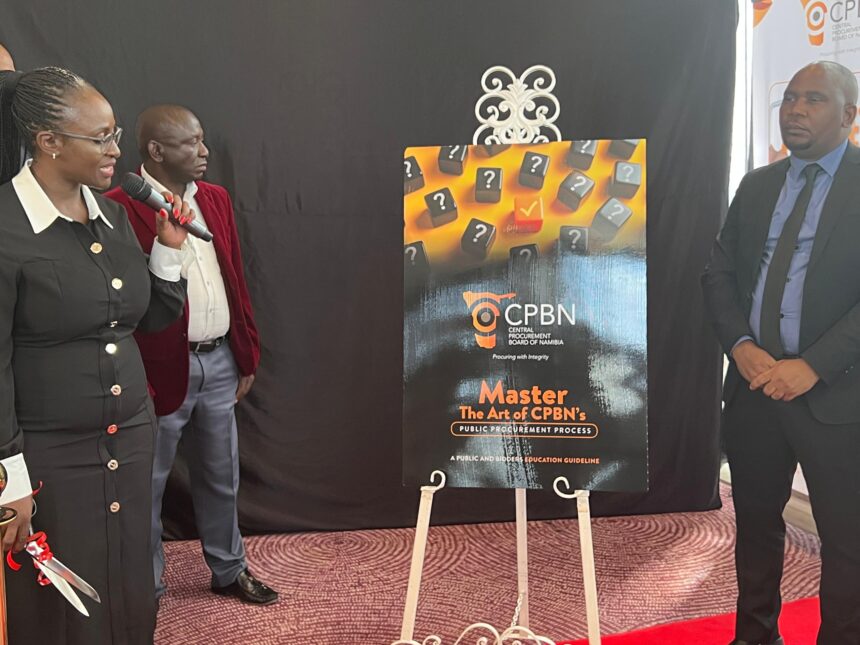In a bid to enhance transparency and accessibility in the public procurement process, the Central Procurement Board of Namibia (CPBN) has launched an extensive media campaign to educate bidders and the public on procurement guidelines
A public and bidder education campaign was launched to create awareness as well as promote fairness and transparency in all business dealings.
Speaking at the launching yesterday, Marry Shiimi, the chairperson of the board of CPBN, said the launch of the campaign, themed ‘Enhancing responsiveness in the bidding process’, signifies a response to a call from bidders, public entities and the public that the entity serves.
It is “a call to be efficient, listen and educate the public as well as create awareness. Most importantly, it is a call to be transparent in all our business dealings,” she noted.
She said there has been significant satisfaction from bidders and clients, which emanates from increasingly unfavourable outcomes from the procurement process.
“So, we embark on a journey to clarify the procurement process to open doors that have been perceived as closed and build bridges where there have been gaps,” Shiimi said.
She noted that the campaign is designed to empower all participants with the knowledge and tools they need to engage effectively in procurement activities. Shiimi said she has been concerned when bids are stuck in courts and services do not reach the public that so much needs it.
“I am concerned, and we should be concerned with the investment we make and the value we get when more than 50% of particpating bidders in a bidding process are disqualified for reasons that could easily have been prevented and do not make it to the financial stage of the bid evaluation proces,” she remarked.
The chairperson made it clear that public procurement is a cornerstone of good governance and economic development.
It is the bridge that connects public needs with the capacities of the Namibian private sector, ensuring that government resources are utilised effectively to bring services to the people who so much need it.
“However, for this system to function optimally, it requires the trust and active participation of all stakeholders involved, government entities, businesses and public alike,” she said. Shiimi added that the CPBN embarked on the launching journey to clarify the procurement process, open doors that have been perceived as closed, and build bridges where there have been gaps.
“Our public and bidder education campaign is designed to empower all participants with knowledge and tools they need to engage effectively in procurement activities,” she clarified.
Shiimi said the campaign will provide the platform to engage, collaborate and give the necessary insights to conduct procurement activities with integrity and efficiency to serve better.
“We are committed to serving you with the best practices and guidelines that align with international standards, ensuring that every decision made is in the best interest of our citizens,” she stated.
Speaking at the same event was Johanna Kambala, manager of stakeholders relations.
She urged the public to utilise CPBN’s digital resources.
“To our viewers at home, you can still scan the QR code to access our communication material. Our website www.cpbn.com.na contains all relevant information regarding the bidding process, requirements and available opportunities,” she stated.
The campaign seeks to dispel common misconceptions surrounding CPBN’s role in the procurement process.
“We want to be as transparent as possible. Many people think that all bids are awarded by CPBN, but that is not the case. We only handle procurements above the threshold set for public entities,” Kambala noted.
She said the Procurement Act established three entities – the Procurement Policy Unit, CPBN and the Review Panel – each with distinct roles in the procurement process.
As part of its efforts, CPBN introduced a 36-page procurement guide to assist bidders in mastering the art of public procurement.
“We have gathered insights from previous bidding evaluations, highlighting common mistakes and best-practices. This guide addresses these issues, ensuring that bidders have the necessary knowledge to submit compliant and competitive bids,” Kambala said.
The booklet is accessible online, with hard copies available for media representatives.
Key elements covered in the guide include bid submission requirements, integrity in procurement, conflict of interest guidelines and pre-bid meeting participation.
She highlighted the importance of accuracy and timeliness in submissions, warning that bids submitted past the deadline would not be accepted.
“We are strict with time. If the bid closes at 11h00, ensure your documents are submitted well before then. Late submissions will not be considered,” she stressed. The campaign extends beyond the capital, with planned outreach programmes in various regions to educate prospective bidders.
“We have already held sessions in places like Oshikuku, Khorixas and Outapi. Our goal is to reach every Namibian entrepreneur, ensuring they understand the procurement process and increase their chances of success,” Kambala revealed. – ljason@nepc.com.na



